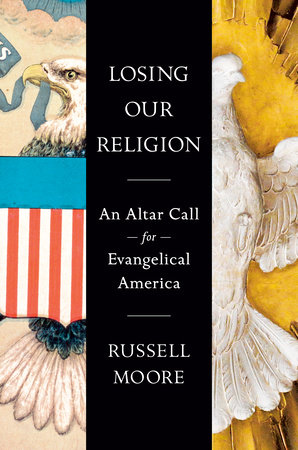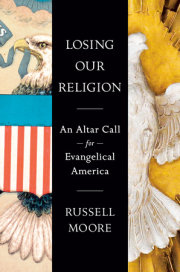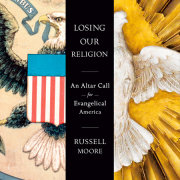If we wanted to find Jesus, we would have to lose our religion. That's what the preacher said. In fact, he said it every week, every Sunday morning and every Sunday night, and then in the fall and the spring, he would bring in a guest evangelist to tell us the same thing. Religion, he said, gave the wrong answers because it asked the wrong questions. Religion asked, "Am I a church member?" or "Am I an American?" Religion asked, "Am I a moral person?" or "Do my good deeds outweigh my bad?" Religion asked, "Can I assent to the fact that the Bible is true?" or "Can I recite a creed or a catechism?"
Those were the wrong questions, and religion gave the wrong answers. The ultimate questions were deeper, more personal: "Do you know you're a sinner?" and "Do you trust the crucified and risen Jesus to atone for that sin?" and "Will you commit your life to taking up your cross and following him?" For those questions, they would assert, religion would not do, only a relationship, a personal, living faith-not your church's faith, not your country's faith, not your family's faith, but yours. If we were to see the kingdom of God, religion couldn't get us there, they said. We must be born again.
Some people call it an altar call. Some call it a "Come to Jesus" meeting. We called it an "invitation." Though we were low-church Mississippi Baptists, who thought we didn't have any ritual or formality, this was part of our liturgy. Every week, at the end of the service, the gospel would be repeated-about how God so loved the world that he gave his only Son, that whoever believed in him would not perish but have everlasting life. Every week the question "How do I become a Christian?" was answered with step-by-step guidance, sometimes even with a prayer a person could repeat. Every head would be bowed, every eye would be closed, but sometimes we would be looking around, with everybody praying that this would be the week that Miss Velma's husband would go down the aisle, to accept Jesus as his personal Lord and Savior.
Every week was an opportunity, not just for the unbelievers but also for all of us. We would ask ourselves: Is there some sin I need to confess today? Do I need to recommit my life to Christ? Is God calling me to "full-time Christian service," maybe even to be a missionary on the other side of the world? While all these questions-from the pulpit and in our own minds-were being asked, the organ would play quietly in the background hymns we all knew by heart: "Just as I am, without one plea, but that Thy blood was shed for me . . ." or "Softly and tenderly Jesus is calling . . . calling, oh, sinner, come home . . ." or "I have decided to follow Jesus . . . no turning back, no turning back."
When I was older, I found much to criticize about this weekly revivalism. It could communicate a kind of "pray this prayer after me" transaction that propped up the nominal, cultural Christianity all across the Bible Belt. It could substitute the biblical language of justification and sanctification with sentimental phrases about "Asking Jesus into your heart." It could become just as much a formality as could praying the rosary or reciting the Nicene Creed. It could reemphasize the sort of individualized Christianity that enabled generations of my ancestors to fight for the enslavement of human beings or to ignore the atrocities of Jim Crow segregation, all with an easy conscience that all was well as long as they repented of the sins the preacher mentioned-personal sins such as getting drunk or playing cards. It could highlight the emotional manipulation inherent in much American evangelicalism.
But I walked those aisles anyway. I "went forward" to profess my faith in Christ, to pray along with the preacher for God to forgive my sins on the basis of the shed blood of Jesus. I "went forward" to rededicate my life to Christ, after I had grown cynical through a time of doubt. I "went forward" to say that I was "surrendering to preach," that is, to give my life to the calling of ministry to the church. And sometimes I "went forward" just for someone to pray for me, often telling the counselor down front that I had an "unspoken," which we all knew was a prayer request about something one didn't want to talk about at the moment. I knelt at the front of one of those aisles, as the ordained men laid hands on me, setting me apart for ministry.
And I believed it all. I went door-to-door telling people the Good News of the gospel, with a tract showing them how to be born again. Because dancing was considered "worldly," I spent the night of my prom at a Bible study in our church's Family Life Center instead. Drinking wine was considered wrong, so the first alcohol I ever drank was not at a college keg party but at a White House Christmas Party when the server accidentally dipped my cup from the "naughty" bowl instead of the "nice" one. Thanks Obama. Not only did I not lose my virginity until my wedding night, I committed at my ordination to the "Billy Graham rule" of not being alone with a woman not my wife. The altar call not only framed my life; it was my life.
One day, though, the "Come to Jesus" meetings changed. I found myself sitting, sometimes for eight hours at a time, with Southern Baptists like me in heresy trials at which I was not the inquisitor I had been trained to be, but the defendant. I hadn't changed my theology, or my behavior, at all. What I had done, as the president of my denomination's public policy agency, was refuse to endorse Donald Trump.
A denominational leader, after one of the countless "Come to Jesus" meetings at which I was upbraided for sacrificing "unity," articulated with bracing clarity what had been implicit for quite a while. "We can't get rid of you," he said (though they tried). "All our wives and kids are with you, but we can do psychological warfare until you think twice before you open your mouth."
What surprised me was that this vitriol came even from some I had counted as mentors. It was nothing personal, they told me. They just wanted to maintain "influence" with the most rightward fringe of the denomination. Those populists would eventually win, they reasoned, and only those who could "stay at the table" would be able to lead long-term.
A friend, and respected older Baptist leader, called when I was at the lowest moment of all this psychological warfare. I assumed it was to check on me or pray with me. Instead, he acted as though I had betrayed a fraternity into which he had inducted me. "This is not how you play the game," he said. "You give them the 90 percent of the red meat they expect, and then you can do the 10 percent of side stuff that you want to do, on immigrants or whatever." He was right. I had played the game poorly. I didn't consider the culturally conservative positions I took to be "red meat." I was pro-life and pro-family for the same reasons I was pro-racial justice and pro-refugee. I didn't realize that we were playing a game. If so, why would I give thirty years of my life to it? The thought that perhaps that's all this was turned out to be the most effective psychological warfare of all.
The breaking point came, though, when an investigative journalist published a report demonstrating cases of hundreds of people sexually abused and assaulted in Southern Baptist churches, along with multiple allegations of churches having covered up such abuses. In attempting to address accountability for such churches and leaders, we faced stonewalling and retaliation for even the most minimal efforts. We sat in mind-numbing meetings behind closed doors where we heard sexual abuse survivors described as "Potiphar's wife" (the Egyptian ruling figure who made a false accusation of rape against the patriarch Joseph) and other spurious biblical analogies. Survivors were often characterized as "crazy" and, at least by one leader, as possibly worse than the abusers themselves. Alt-Right fundamentalist groups in the denomination implied that the "MeToo movement" within our denomination was a tool of the devil himself, and one of them made the case that those of us saying that racism and misogyny were real problems in our denomination were denying the "sufficiency of Scripture" by embracing "cultural Marxist" movements. That no one questioned how this group was itself not violating the sufficiency of Scripture by making this case via the testimony of avowed atheists, featured in their meetings and resources, was an irony no one seemed to notice. Even fewer seemed to point out that the most revered leaders behind these movements were themselves credibly charged with sexual misconduct.
At a conference I hosted, a national advocate for sexual abuse survivors mentioned publicly, with the woman's permission, the horrific mistreatment a sexual abuse survivor had endured at the hands of a Southern Baptist entity. That entity's president called a meeting to ask me how I could let this happen, and to remind me that I had a responsibility to "protect the base." The problem was not with the sexual abuse crisis itself-we were repeatedly rebuked for using the word crisis-but with those who spoke publicly about it. After all, the reasoning went, churches might stop giving to the institutions and that would hurt missionaries, which would hinder the advance of the gospel. All would have been well for me, the message was clear, if I just would treat sexual abuse like an "unspoken" prayer request-a vague and unarticulated concern with no specifics, at least not in public. Within months, that same entity launched (purely coincidentally, they assured me) yet another "investigative task force" to determine whether I and my team were too "liberal."
Through all of it I maintained what some said was a Stockholm syndrome level of loyalty to my Southern Baptist identity. Partly that was because I was convinced that most people in the pews and in the pulpits were unaware of what was happening behind the veil. And I couldn't say anything without those attacking me charging me with being "divisive," and thus prompting my own supporters to ask why I couldn't just give "the brothers" a little bit more of what they wanted, in order not to disrupt the flow of support to our missionaries around the world. And part of it was because I couldn't think of myself as anything other than a Southern Baptist. I was still the kid carrying the Christian flag down the aisle at Vacation Bible School's opening assembly. And when Southern Baptists said, "Depart from me, you worker of iniquity, I never knew you," it sounded to me as if Jesus himself were saying it. So I smiled my way through it all, telling people, when asked, about all the good things Southern Baptists did, and how we couldn't judge them on the basis of a few corrupt people in leadership.
My wife, though, had heard that speech too many times. "I love you. I'm with you to the end. And you can do whatever you want," she said, as we walked out of a particularly hostile Southern Baptist Convention Executive Committee meeting. "But if you're still a Southern Baptist by summer, you'll be in an interfaith marriage." She is not a woman given to ultimatums. But she'd seen and heard too much. By that point, so had I. In that moment, I resolved two things. The first was that I would still trust and obey the Jesus to whom Southern Baptists introduced me, and I would follow him, whether he has a southern accent or not, whether his Jordan River baptism was full immersion or not. And the second was that I would never be at another Baptist business meeting again. I was not losing my faith, but I was losing my religion. The altar call they were issuing had me walking the opposite way, right out the back doors and into a world I'd never known before.
On the other side of that reverse altar call, I started to question everything. Was that all it was? Had it all been a lie? That began a period not just of questioning all my assumptions, but also of simultaneously grieving my lost religious home and my own burdened conscience, recognizing complicity in participating for so long in something that now seemed both inane and predatory. I couldn't help but wonder if the plot twist to the story of American conservative Christianity was that what we thought was the Shire was Mordor all along. I pretend that all of that is past me, but it lingers, in the ringing in my ears of the stress-induced tinnitus that persists to this day, and in the fact that I am still waiting for one sleep without nightmares about the Southern Baptist Convention. But here I am, an accidental exile but an evangelical after all.
My situation was especially public, but it wasn't especially unusual. The issues-political fusion with Trumpism, Christian nationalism, white-identity backlash, the dismissing of issues such as abuse as "social justice" secularism, and several others-are (some of them or all of them) dividing almost every church, almost every family, almost every friendship I know. Every institution-from the presidency to local churches to family dining room tables-seems to be in crisis, almost to the point of breakdown. Where at the beginning of my ministry parents used to seek my counsel about their young-adult children walking away from the faith, I was now more likely to hear from committed younger Christians wondering how to connect with parents who were politically radicalized by conspiracy theories. I was less likely to hear about wayward children going out into "the real world" and losing their faith as I was to hear about wayward parents retreating into an imaginary world and losing their minds. After a near-decade of American evangelical Christianity defined almost wholly in the public view with Trumpism or racism or the predatory sexual or financial or psychological power dynamics of countless leaders, the outside world didn't seem to be judging us by "secular" standards as by our own. Weighed in those balances, we were found wanting. Our kingdom was divided and couldn't stand. Our houses were built upon the sand. The very populist and entrepreneurial energies that led American evangelical Christianity to grow into a world-influencing movement and into a powerful political influence bloc seemed to be what was now undoing us, right down to friendships of decades.
Copyright © 2023 by Russell D. Moore. All rights reserved. No part of this excerpt may be reproduced or reprinted without permission in writing from the publisher.






